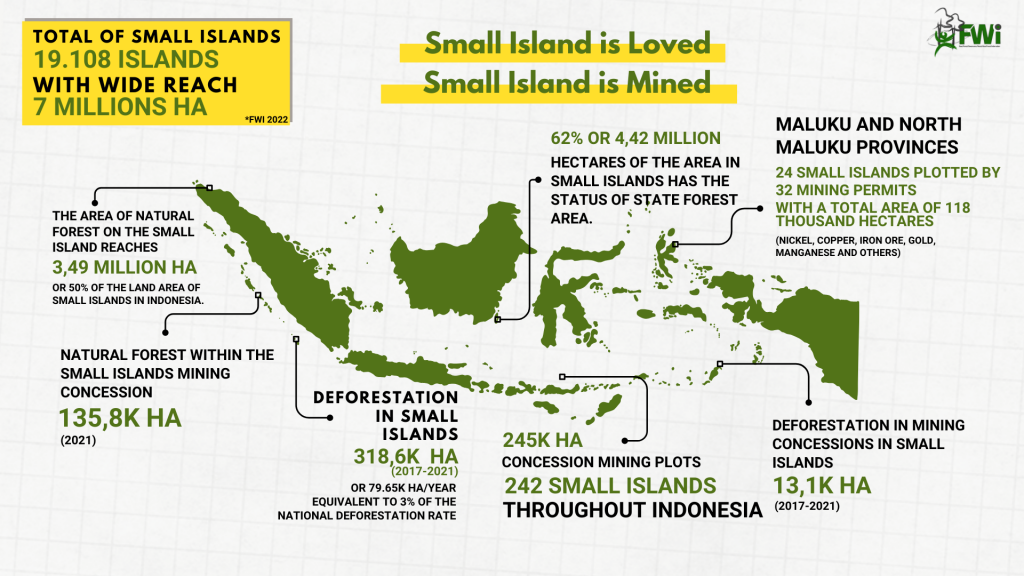
Jakarta, March 27th, 2024 – Indonesia, known as the largest archipelagic nation globally, boasts over 19,108 islands according to FWI records from 2023. More than 99% of these islands fall under the classification of small islands, as defined by Laws No. 27/2007 and No. 1/2014 regarding Coastal Areas and Small Island Management (PWP3K). The total area of small islands in Indonesia extends for around 7 million hectares, which is equivalent to 105 times the size of DKI Jakarta. Mining arises as one of the sectors posing the most significant threat to the existence of small islands in Indonesia.
Forest Watch Indonesia notes that as much as 876 thousand hectares of small islands in Indonesia have been taken over by corporation concessions, of which 245 thousand hectares have been allocated for mining purposes. These mining concessions cover 242 islands.
The situation is expected to deteriorate further as the downstream programs continue to be intensified, even continued by the elected presidential candidates Prabowo Subianto and Gibran Rakabuming Raka. Without safeguards, this situation will lead Indonesia into deforestation “pitfalls” and natural resource degradation. Where presently, deforestation on small islands already reached 318.6 thousand hectares (2017 – 2021), which equals to 3% of national overall deforestation.
The Failure to Legalize Mining on Small Islands
The Law No. 27 of 2007 about Coastal and Small Island Management (PWP3K) clearly defines small islands as islands with an area of less than or equal to 2,000 square kilometers or 200,000 hectares. This law provides protection and conservation to coastal and small island areas by restricting utilization activities, especially extractive activities such as mining.
PT Gema Kreasi Perdana (GKP), as a subsidiary company of the Harita Group, submitted a judicial review to the Constitutional Court regarding Law No. 27 of 2007. PT GKP firmly filed a lawsuit against the Article 37 letter K of the Law, which prohibits mineral mining in coastal areas and small islands. PT GKP has a concession of 1,800 Ha on Wawonii Island (Konawe Islands Regency) which covers an area of 70.6 thousand Ha. Wawonii island can be considered a small island based on the law, thus PT GKP sued it.
The good news is, that the Constitutional Court denied the lawsuit for judicial review of Law no. 27 of 2007 in the decision hearing for case number 35/PUU-XXI/2023, concerning Management of Coastal Areas and Small Islands (PWP3K) submitted by PT GKP. This decision was read out on Thursday (21/3/24), led by the head of the Constitutional Court, Suhartoyo. This marks the end of the efforts to legalize mining on small islands by the company.
The Forum of Eastern Academics Against Mining on Small Islands responds to the decision of the Constitutional Court. Professor Agustinus Kastanya, an academic from Pattimura University, emphasizes that the decision of the Constitutional Court is a momentum to halt mining activities on small islands, which have a massive destructive potential in the Eastern Indonesian region. It is noted that in the provinces of Maluku and North Maluku alone, there are 32 mining permits (for nickel, copper, iron ore, gold, manganese, and others) covering 24 small islands with a total area of 118 thousand hectares. As a follow-up to the Constitutional Court’s decision, monitoring and auditing of mining activities on small islands must be done as considerations for permit revocation. It is also important to ensure that there are no new mining permits issued for small islands, especially in the Eastern region, which is essentially the living space of indigenous communities.
Mining causes massive environmental damage, leading to pollution in rivers, coastal areas, and oceans, thus resulting in the loss of livelihoods and poverty among communities. This also includes the loss of biodiversity, added Professor Agus.
Professor Laode M. Aslan, an academic from Halu Oleo University, affirms that the Constitutional Court’s decision is an opportunity to reform mining governance on small islands. In Indonesia, numerous small islands have been damaged or even lost due to mining activities. Mining leads to environmental pollution and the conversion of productive lands traditionally used by local and indigenous communities for fisheries and agriculture into unproductive ones. In Southeast Sulawesi, hundreds of hectares of fishponds are damaged and unusable due to pollution, causing difficulties for fishermen to catch fish. The evaluation must be conducted, including auditing of mining operations on small islands in a comprehensive way.
Fundamentally, the country has established safety net instruments to protect the existence of small islands. Dr. Andi Chairil Ichsan, an academic from Mataram University, explains that the Constitutional Court’s decision strengthens the management instruments for coastal areas and small islands, both in the legal system at the central and regional levels. This ensures that small islands can grow and develop based on their regional characteristics. These efforts close any chance for irresponsible parties to engage in environmental crimes in island territories.
The Decision of Constitutional Court Clarifies the Concept of Managing Small Islands.
Anggi Putra Prayoga, FWI Media Advocacy Campaign Manager, explains that the natural forest area on small islands reaches 3.49 million hectares, or equivalent to 50% of the land area of small islands in Indonesia. These natural forests have very significant ecological, social, and economic functions. The loss of natural forests due to massive conversion can threaten the existence of small islands that are vulnerable to environmental changes.
The Constitutional Court’s decision to deny PT GKP’s lawsuit is a significant step forward in efforts to protect natural forests. Data from FWI indicates that deforestation of natural forests solely caused by mining on small islands in Indonesia amounts to a rather significant figure, which approximately reach 13.1 thousand hectares (2017-2021). At the very least, the decision of the Constitutional Court has sought to preserve the remaining natural forests, covering an expansive area of 51.95 thousand hectares, from mining activities on small islands in the Konawe Islands Regency.
Closing off space for mining on small islands is an appropriate management approach because managing small islands is not the same as managing large ones. Each small island has its own characteristics and uniqueness, and excessive intervention only leads to overlapping interests, Anggi concludes.

Conclusion: Amplifying Protection for Small Islands
The Constitutional Court’s rejection of PT GKP’s judicial review is a considerable step forward in protecting the environment and the living space of communities/indigenous peoples in Indonesia. This decision emphasizes the protection of small islands to preserve the environmental, economic, and social sustainability of communities there. The Constitutional Court’s ruling has enhanced the spirit to save the natural forests on small islands throughout Indonesia from mining activities, which have reached an extensive area of 135.8 thousand hectares.
The Constitutional Court’s decision serves as evidence that environmental justice is being upheld. Mining companies currently operating on small islands have clearly violated Law No. 27 of 2007, which restricts mining activities on small islands. Auditing of mining operations on small islands must be implemented to create a better life for communities/indigenous peoples.
Contact Person:
Media FWI (+62 857-2034-6154)
The attachment of nickel mining documentation on Manoram Island, Raja Ampat Regency, Southwest Papua Province, can be accessed and downloaded through the following link: Documentation of Nickel Mining on Manoram Island.



